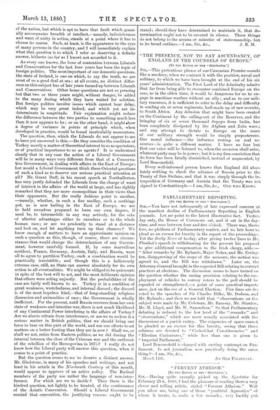PARLIAMENTARY REPORTING.
[TO THE EDITOR OF THE " SPECTATOR.")
SIR,—You have not infrequently of late expressed concern at the manifest decline of Parliamentary Reporting in English journals. Let me point to the latest illustrative fact. Yester- day only, the House of Commons sat, and it sat in the day- time, and rose between four and five o'clock. There was, there- fore, no plethora of Parliamentary matter, and no late hour to plead as an excuse for brevity in the report of the proceedings. Yet the Daily News of to-day, after giving twelve lines to Mr. Plunket's speech in withdrawing for the present his proposal to give additional compensation to the Irish clergy, adds :- " After remarks by Mr. Rylands, Major Nolan, and Mr. Erring- ton, disapproving of the scope of the measure, the motion was agreed to, and the Bill was withdrawn." Later on, the Attorney-General brought in the expected Bill relating to corrupt practices at elections. The discussion seems to have turned on the question whether the easing provision relating to the em- ployment of vehicles to convey voters to the poll should be repealed or strengthened,—a point of some practical import- ance, just on the eve of a General Election. Five lines are de- voted to the speeches of Sir Charles Dilke, Mr. Dodson, and Mr. Rylands ; and then we are told that " observations on the subject were made by Mr. Coleman, Mr. Ramsay, Mr. Stanton, Mr. M. Lloyd, and Mr. W. Samuelson." So that Parliamentary debating is reduced to the low level of the " remarks" and " observations," which are more usually associated with the discussions of a parish vestry. The exigencies of space cannot be pleaded as an excuse for this brevity, seeing that three columns are devoted to " Cocked-bat Constituencies " and " Election Caricatures," while less than one is given to " Imperial Parliament."
Lord Beaconsfield is charged with casting contempt on Par- liament. Is not journalism now practically doing the same thing P—I am, Sir, &c.,


































 Previous page
Previous page